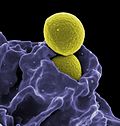Immunology
Immunology is a specialized branch of medical and biological sciences focused on understanding the immune system. This intricate system is responsible for defending the body against invading pathogens and ensuring its ability to recognize and differentiate between self and non-self. The study of immunology encompasses not only the normal functioning of the immune system but also disorders and abnormalities that can affect it.
Overview of the Immune System[edit]
The immune system is a multifaceted and coordinated defense system comprising various cells, tissues, and organs. Its primary objective is to safeguard the body from harmful invaders, such as bacteria, viruses, and other pathogens. The immune system can be broadly categorized into two components:
- Innate Immunity: This represents the body's first line of defense. It provides immediate but generalized protection against invaders. Components of innate immunity include physical barriers like the skin, as well as immune cells like macrophages and neutrophils.
- Adaptive Immunity: Unlike innate immunity, the adaptive immune system is highly specific to individual pathogens. It takes time to develop after an initial exposure but provides long-lasting immunity. Key players in adaptive immunity are T cells and B cells, which are responsible for cell-mediated and humoral immunity, respectively.
Disorders of the Immune System[edit]
The immune system, while sophisticated, is not infallible. It can be compromised or malfunction in various ways:
- Immunodeficiencies: Conditions where components of the immune system are absent or not functioning adequately, leaving the body more susceptible to infections. Examples include HIV/AIDS and certain genetic disorders.
- Autoimmune Disorders: Situations in which the immune system mistakenly targets the body's own tissues as foreign. Examples include rheumatoid arthritis, lupus, and type 1 diabetes.
- Hypersensitivities: Overreactions of the immune system to certain stimuli, leading to allergic reactions. Conditions like asthma, hay fever, and anaphylaxis fall under this category.
Study and Research in Immunology[edit]
The field of immunology is vast, and continuous research has led to significant advancements in our understanding of the immune system. Scientists and medical professionals delve into:
- Mechanisms of immune responses at the molecular, cellular, and organ level.
- Vaccine development for various diseases.
- Immune system's role in cancer and the potential for immunotherapies.
- Interactions of the immune system with other body systems and the environment.
Clinical Relevance[edit]
For medical professionals, a sound understanding of immunology is vital for:
- Diagnosing and managing immune-related disorders.
- Advising patients on vaccination schedules and benefits.
- Offering treatments that modulate or enhance immune responses, especially in conditions like cancer or chronic infections.
Conclusion[edit]
Immunology provides a comprehensive insight into one of the body's most crucial systems. As researchers continue to unravel its complexities, there's hope for new interventions and therapies that can harness the power of the immune system for the benefit of patients.
|
|
|
Immunology[edit]
Ad. Transform your life with W8MD's Budget GLP-1 injections from $49.99


W8MD offers a medical weight loss program to lose weight in Philadelphia. Our physician-supervised medical weight loss provides:
- Weight loss injections in NYC (generic and brand names):
- Zepbound / Mounjaro, Wegovy / Ozempic, Saxenda
- Most insurances accepted or discounted self-pay rates. We will obtain insurance prior authorizations if needed.
- Generic GLP1 weight loss injections from $49.99 for the starting dose of Semaglutide and $65.00 for Tirzepatide.
- Also offer prescription weight loss medications including Phentermine, Qsymia, Diethylpropion, Contrave etc.
NYC weight loss doctor appointmentsNYC weight loss doctor appointments
Start your NYC weight loss journey today at our NYC medical weight loss and Philadelphia medical weight loss clinics.
- Call 718-946-5500 to lose weight in NYC or for medical weight loss in Philadelphia 215-676-2334.
- Tags:NYC medical weight loss, Philadelphia lose weight Zepbound NYC, Budget GLP1 weight loss injections, Wegovy Philadelphia, Wegovy NYC, Philadelphia medical weight loss, Brookly weight loss and Wegovy NYC
|
WikiMD's Wellness Encyclopedia |
| Let Food Be Thy Medicine Medicine Thy Food - Hippocrates |
Medical Disclaimer: WikiMD is not a substitute for professional medical advice. The information on WikiMD is provided as an information resource only, may be incorrect, outdated or misleading, and is not to be used or relied on for any diagnostic or treatment purposes. Please consult your health care provider before making any healthcare decisions or for guidance about a specific medical condition. WikiMD expressly disclaims responsibility, and shall have no liability, for any damages, loss, injury, or liability whatsoever suffered as a result of your reliance on the information contained in this site. By visiting this site you agree to the foregoing terms and conditions, which may from time to time be changed or supplemented by WikiMD. If you do not agree to the foregoing terms and conditions, you should not enter or use this site. See full disclaimer.
Credits:Most images are courtesy of Wikimedia commons, and templates, categories Wikipedia, licensed under CC BY SA or similar.
Translate this page: - East Asian
中文,
日本,
한국어,
South Asian
हिन्दी,
தமிழ்,
తెలుగు,
Urdu,
ಕನ್ನಡ,
Southeast Asian
Indonesian,
Vietnamese,
Thai,
မြန်မာဘာသာ,
বাংলা
European
español,
Deutsch,
français,
Greek,
português do Brasil,
polski,
română,
русский,
Nederlands,
norsk,
svenska,
suomi,
Italian
Middle Eastern & African
عربى,
Turkish,
Persian,
Hebrew,
Afrikaans,
isiZulu,
Kiswahili,
Other
Bulgarian,
Hungarian,
Czech,
Swedish,
മലയാളം,
मराठी,
ਪੰਜਾਬੀ,
ગુજરાતી,
Portuguese,
Ukrainian




